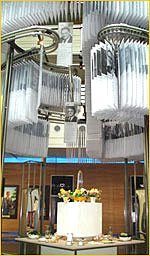Now I've xin it all
"I don't mind if Gandalf doesn't come, as long as his staff comes."Or something equally mindnumbing. Friends and other loved ones are invited to celebrate this young wonder amongst us.
ximple: an explanation that is obvious to the speaker but not the listener. It can be used following or preceding the explanation itself, "Look, it's really so ximple."
xincere: praise said gushingly. Almost a twitter but not quite. The word is usually used upon receiving such praise, for example, "Thank you, that was quite xincere." But can be used at the end of a letter or posting, too. As in, Yours xincerely, brownpanda. When used this way, it means that I not only like you but I can feel we share such vibes, it’s scary.
xintillating: a mind or conversation that sparkles but remains incomprehensible
xinical: random statements interjected into conversations at random moments. As in, “That was a rather xinical remark.”
xinbiosis: a close friendship characterised by conversations comprising unfinished sentences and/or exclamations. A typical conversation might go something like this:
Girl A: Did you see that movie?The bemused onlooker has no idea which movie they are talking about, let alone know how they feel. The sentences invariably end with exclamation marks and lots of screaming and giggling. There is also a strong religious undertone. You get the drift. Maybe not, but you know how it goes. It's a highly refined form of twittering.
(It's always girls. Only girls have that kind of psychic insight into each other minds that transcends words. They look for a similar insight in the men they love but alas, we invariably disappoint. Anyway, the conversation begins innocently enough.)
Girl B: Which one?
Girl A: You know, the one where...
Girl B: Yes, yes, yes. I saw it yesterday.
Girl A: Isn't it wonderful?
Girl B: Omigod, the guy...he's so CUTE!
Girl A: Oh yes, I know. And in that scene...
Girl B: That's right. Omigod, I could like totally die!
Girl A: God yes, I know exactly how you feel!
xintax: a branch of logic that proves that everything evolves from and revolves around ballet and dance, OR which, it didn't quite happen that way but there were a number of signs, and to cut a long story short, "God told me."
We welcome other contributions. Oh yes, a word on pronunciation. The words are pronounced with an emphatic or hard 'sss' sound, which might, to untrained ears seem to indicate a high level of sarcasm.


















